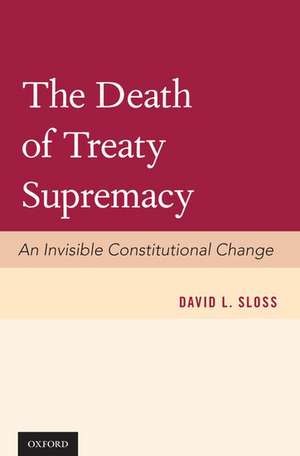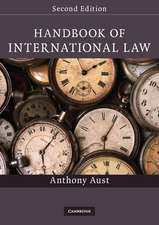The Death of Treaty Supremacy: An Invisible Constitutional Change
Autor David L. Slossen Limba Engleză Hardback – 27 oct 2016
Preț: 737.72 lei
Preț vechi: 905.51 lei
-19% Nou
Puncte Express: 1107
Preț estimativ în valută:
141.16€ • 147.38$ • 116.83£
141.16€ • 147.38$ • 116.83£
Carte disponibilă
Livrare economică 04-10 martie
Preluare comenzi: 021 569.72.76
Specificații
ISBN-13: 9780199364022
ISBN-10: 0199364028
Pagini: 472
Dimensiuni: 236 x 165 x 33 mm
Greutate: 0.95 kg
Editura: Oxford University Press
Colecția OUP USA
Locul publicării:New York, United States
ISBN-10: 0199364028
Pagini: 472
Dimensiuni: 236 x 165 x 33 mm
Greutate: 0.95 kg
Editura: Oxford University Press
Colecția OUP USA
Locul publicării:New York, United States
Recenzii
[The Death of Treaty Supremacy] is necessary reading for all who study, practice or teach in the fields of international or foreign relations law or otherwise want or need to understand the role of treaties in the U.S. legal system.
The 1783 Peace Treaty was the foundation stone of the nation, which is why the U.S. Constitution commands that treaties 'shall be the supreme law of the Land', co-equal to the Constitution and Congress's laws. In this book, David Sloss shows how, after World War II, American conservatives' hositlity to human rights treaties undermined and then neutered the constitutional command of treaty supremacy. Sloss' account of this constitutional mutiny is powerful, thought-provoking, and timely.
The Death of Treaty Supremacy makes a major contribution to our understanding of American constitutionalism. It demonstrates the evolutionary nature of constitutional law, identifies the complex practical forces that drive its evolution, and highlights yet another flaw in constitutional 'originalism'. It shows that historical changes have transformed the Constitution's meaning even on an issue where the 'original' meaning was actually clear and specific -- that properly ratified treaties are 'supreme' over state law.
In The Death of Treaty Supremacy, one of the nation's foremost treaty scholars tells a story of interest to all who care about constitutional change. It's a story of constitutional change driven by political and legal elites rather than courts, largely unnoticed even among the wider legal community, yet with significant implications for U.S. foreign relations law. The book is a fascinating contribution to not just treaty law, but to constitutional law as a whole.
David Sloss has written a fascinating case study on a central constitutional question - how does the interpretation of the constitution change? Moreover, Scloss has taken as his example a pressing issue of contemporary constitutional debate - the role of treaties as domestic law in state and federal courts. His fine-grained and wide-reaching research and his thoughtful analysis benefits us all.
A superior study, deservedly awarded the Certificate of Merit in Creative Scholarship by the American Society of International Law in 2017.
The 1783 Peace Treaty was the foundation stone of the nation, which is why the U.S. Constitution commands that treaties 'shall be the supreme law of the Land', co-equal to the Constitution and Congress's laws. In this book, David Sloss shows how, after World War II, American conservatives' hositlity to human rights treaties undermined and then neutered the constitutional command of treaty supremacy. Sloss' account of this constitutional mutiny is powerful, thought-provoking, and timely.
The Death of Treaty Supremacy makes a major contribution to our understanding of American constitutionalism. It demonstrates the evolutionary nature of constitutional law, identifies the complex practical forces that drive its evolution, and highlights yet another flaw in constitutional 'originalism'. It shows that historical changes have transformed the Constitution's meaning even on an issue where the 'original' meaning was actually clear and specific -- that properly ratified treaties are 'supreme' over state law.
In The Death of Treaty Supremacy, one of the nation's foremost treaty scholars tells a story of interest to all who care about constitutional change. It's a story of constitutional change driven by political and legal elites rather than courts, largely unnoticed even among the wider legal community, yet with significant implications for U.S. foreign relations law. The book is a fascinating contribution to not just treaty law, but to constitutional law as a whole.
David Sloss has written a fascinating case study on a central constitutional question - how does the interpretation of the constitution change? Moreover, Scloss has taken as his example a pressing issue of contemporary constitutional debate - the role of treaties as domestic law in state and federal courts. His fine-grained and wide-reaching research and his thoughtful analysis benefits us all.
A superior study, deservedly awarded the Certificate of Merit in Creative Scholarship by the American Society of International Law in 2017.
Notă biografică
David L. Sloss is Professor of Law and Director of the Center for Global Law and Policy at Santa Clara University Law School. Professor Sloss focuses his scholarship on the application of international law in domestic courts, with specializations in international human rights law, treaties, U.S. foreign relations law, and constitutional law. He is the editor of The Role of Domestic Courts in Treaty Enforcement: A Comparative Study (2009), and co-editor of International Law in the U.S. Supreme Court: Continuity and Change (2011). He has published numerous articles on the history of U.S. foreign affairs law and the judicial enforcement of treaties in domestic courts. Professor Sloss received his B.A. from Hampshire College, his M.P.P. from the Kennedy School of Government at Harvard, and his J.D. from Stanford Law School. He taught for nine years at Saint Louis University School of Law.












